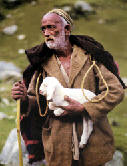(Psalms 25 KJV) "A Psalm of David.
Unto thee, O LORD, do I lift up my soul.
{2} O my God, I trust in thee:
let me not be ashamed,
let not mine enemies triumph over me.
{3} Yea, let none that wait on thee be ashamed:
let them be ashamed which transgress without cause.
I would think that a man should be ashamed of any transgression and
that there is no just cause. And yet we are sometimes presented with
exigent circumstances in which a transgression is not imputed to a
man. David and the showbread is an example that comes to mind. Jesus
said plainly that it was not lawful for David to eat it, David not
being a priest, but he also seems to justify it. It is also not
uncommon to hear people argue that it is no sin to lie to save a life
(as in saving Jews from Nazis). Perhaps a better argument would be
that it is always a sin to lie, but that there might be cause in which
God would not impute the sin.
{4} Show me thy ways, O LORD;
teach me thy paths;
{5} Lead me in thy truth, and teach me:
for thou art the God of my salvation;
on thee do I wait all the day.
"Teach me," twice in this stanza, show and teach, lead
and teach. I gather that we have a learning curve in our walk with
God.
{6} Remember, O LORD,
thy tender mercies and thy lovingkindnesses;
for they have been ever of old.
{7} Remember not the sins of my youth,
nor my transgressions:
according to thy mercy remember thou me
for thy goodness' sake, O LORD.
This leads me to wonder if God himself places the sins of youth in
a different category from the sins of an adult man.
{8} Good and upright is the LORD:
therefore will he teach sinners in the way.
{9} The meek will he guide in judgment:
and the meek will he teach his way.
God will teach sinners. Thatís a far cry from smiting them to the
ground. But the last half of this stanza suggests that it is the meek
sinner gets this break, not the high handed sinner. He will teach
sinners and teach the meek.
There are two different words translated "teach" in this
psalm. The one, yarah, is the verbal form of torah, Torah
meaning teachings. The other verb is lamad, "to
goad." In verses5, 8 and 12 the word is yarah, in verses 4
and 9 it is lamad.
{10} All the paths of the LORD are mercy and truth
unto such as keep his covenant and his testimonies.
{11} For thy name's sake, O LORD,
pardon mine iniquity; for it is great.
The Ten Commandments are called the Testimony of God, and the Ark
of the Covenant was originally called, "The Ark of the
Testimony."
{12} What man is he that feareth the LORD?him
shall he teach in the way that he shall choose.
{13} His soul shall dwell at ease;
and his seed shall inherit the earth.
{14} The secret of the LORD is with them that fear him;
and he will show them his covenant.
{15} Mine eyes are ever toward the LORD;
for he shall pluck my feet out of the net.
{16} Turn thee unto me, and have mercy upon me;
for I am desolate and afflicted.
{17} The troubles of my heart are enlarged:
O bring thou me out of my distresses.
{18} Look upon mine affliction and my pain;
and forgive all my sins.
{19} Consider mine enemies; for they are many;
and they hate me with cruel hatred.
{20} O keep my soul, and deliver me:
let me not be ashamed; for I put my trust in thee.
{21} Let integrity and uprightness preserve me;
for I wait on thee.
{22} Redeem Israel, O God, out of all his troubles."
|
